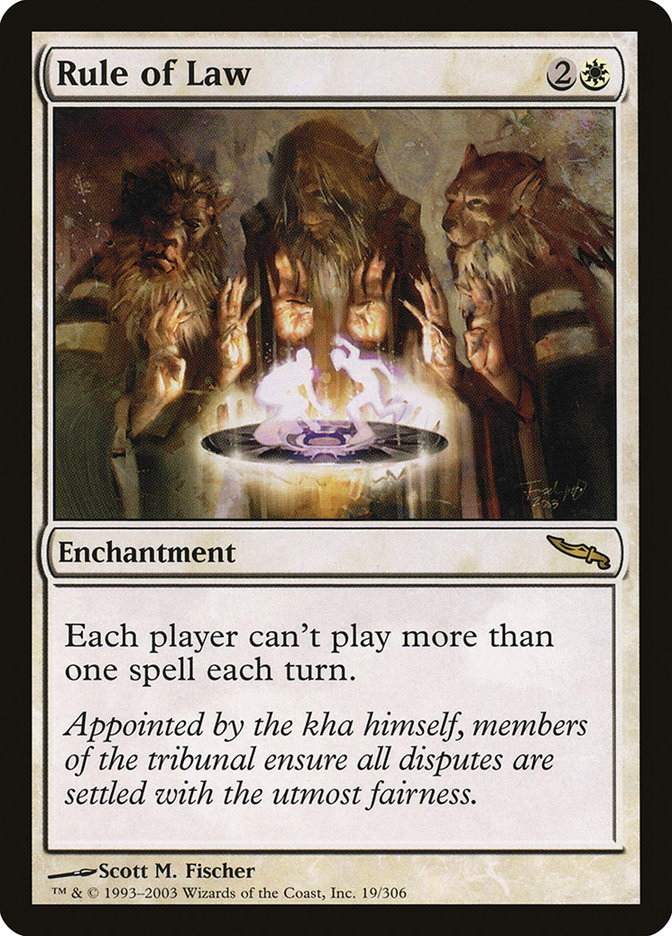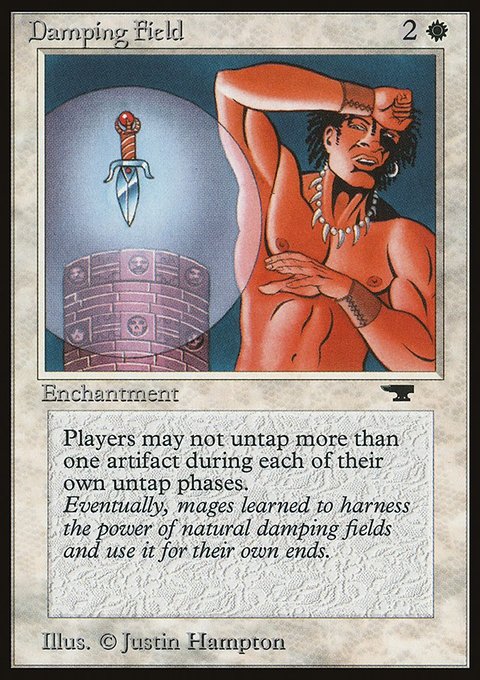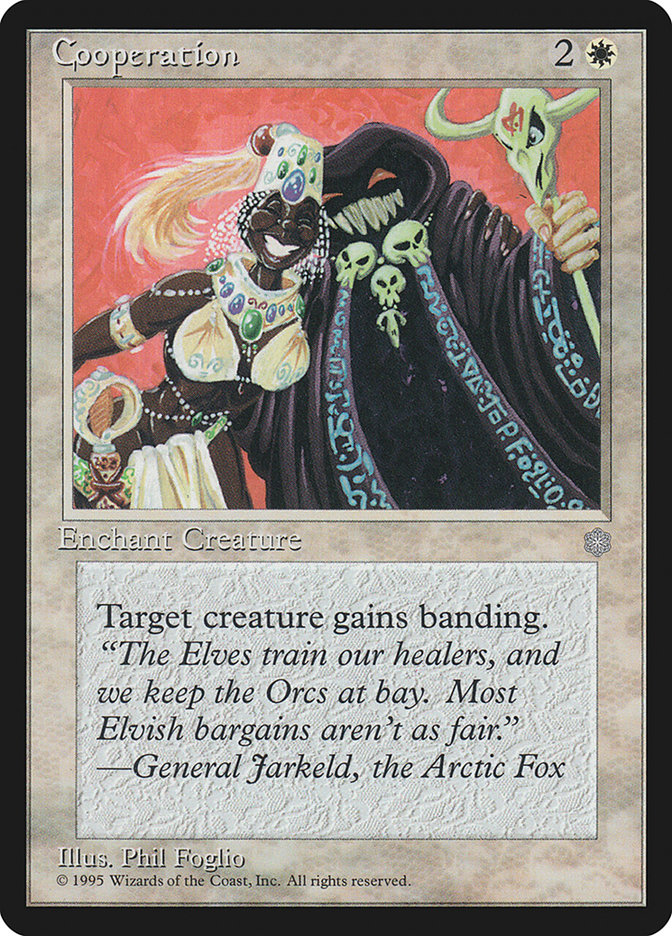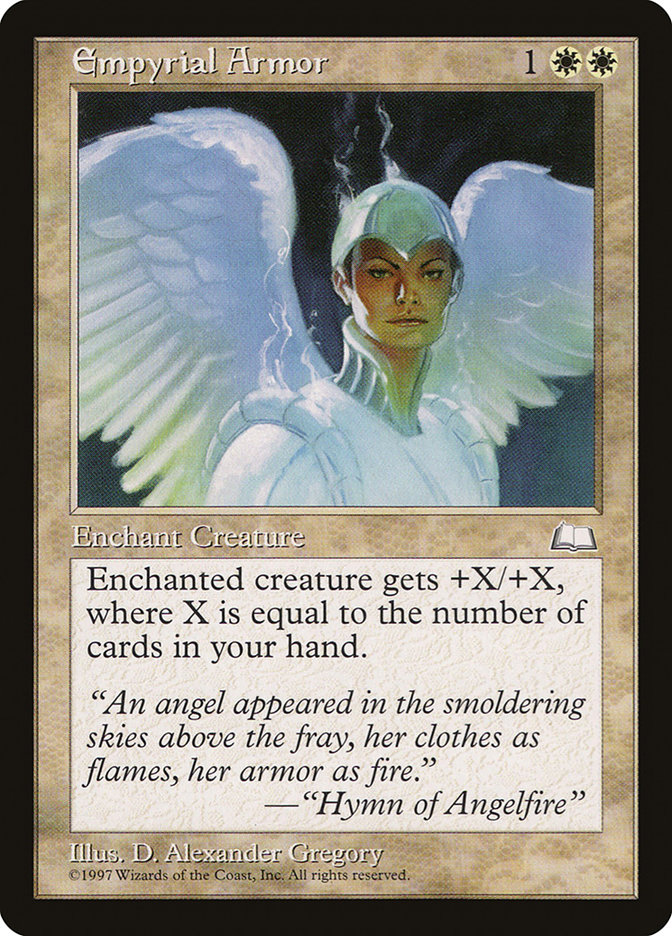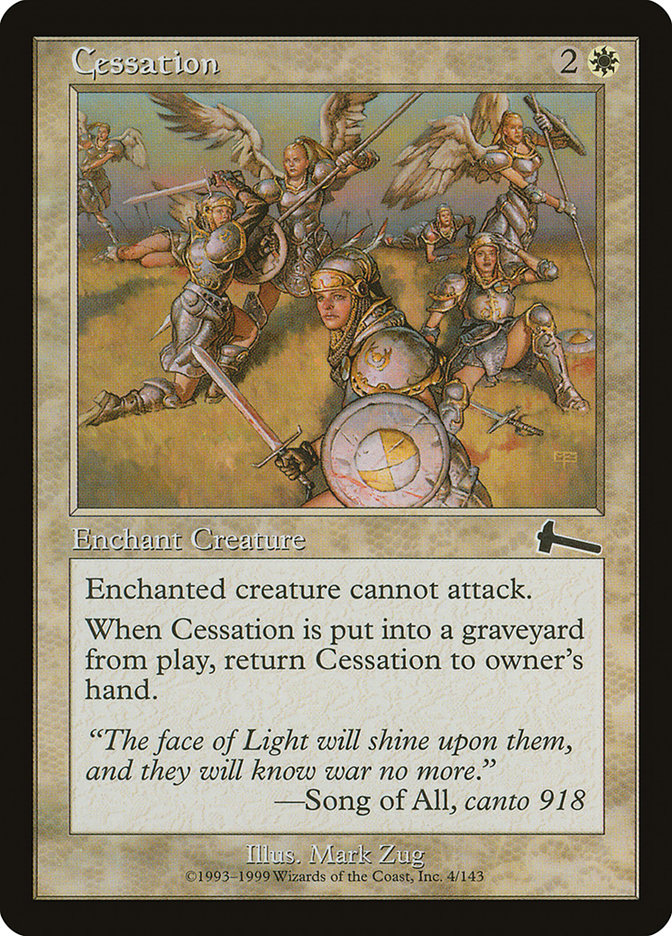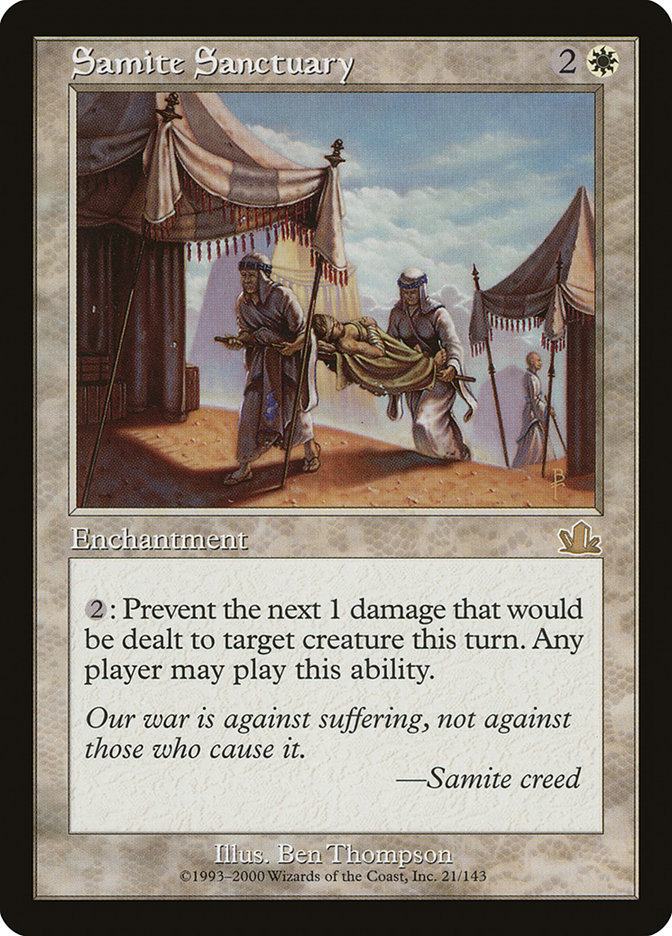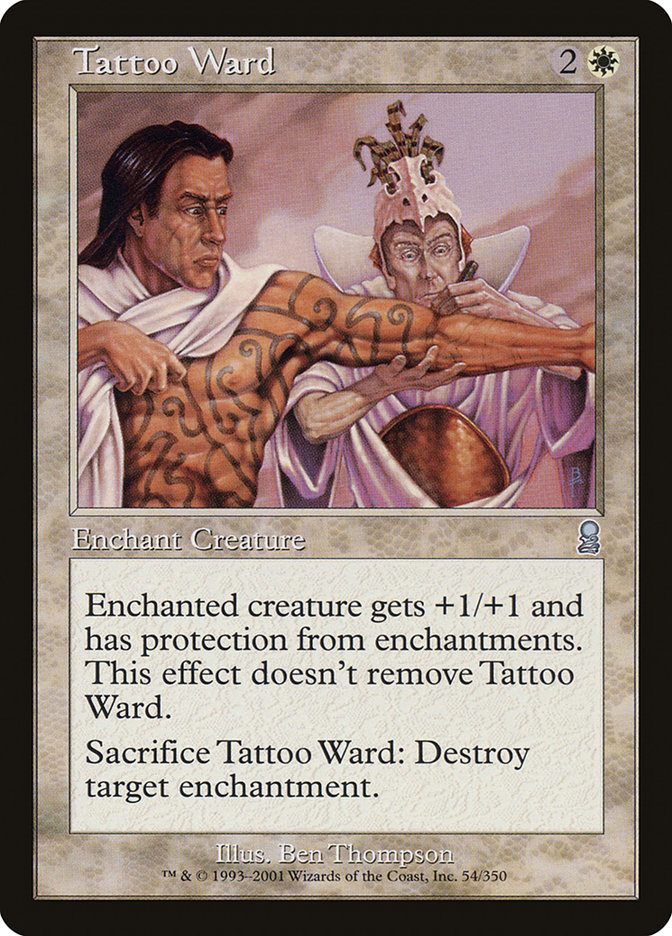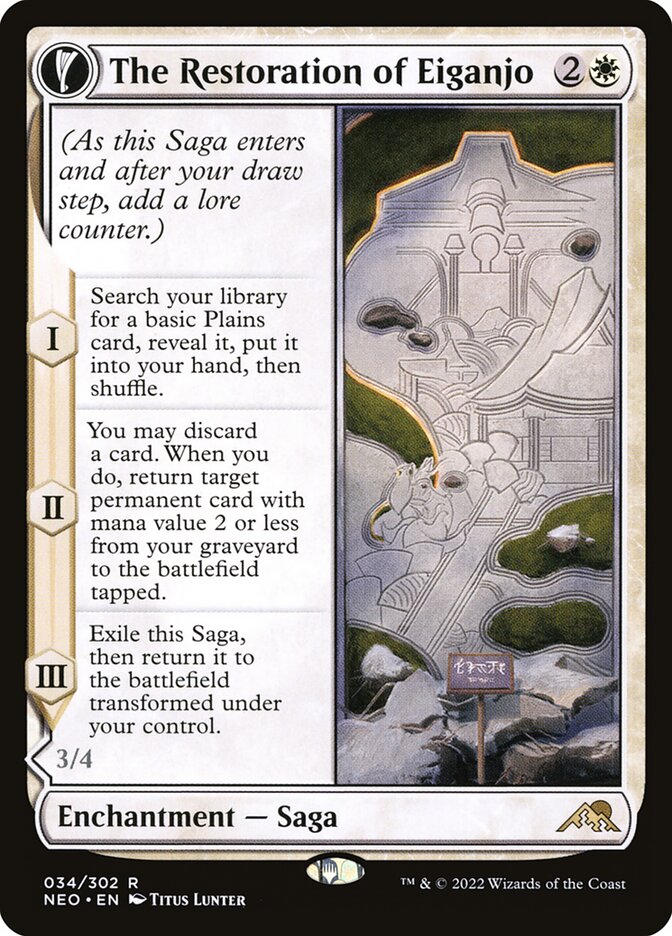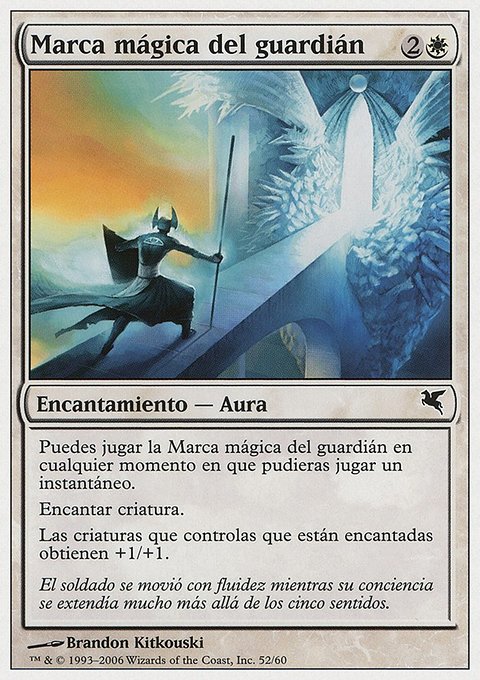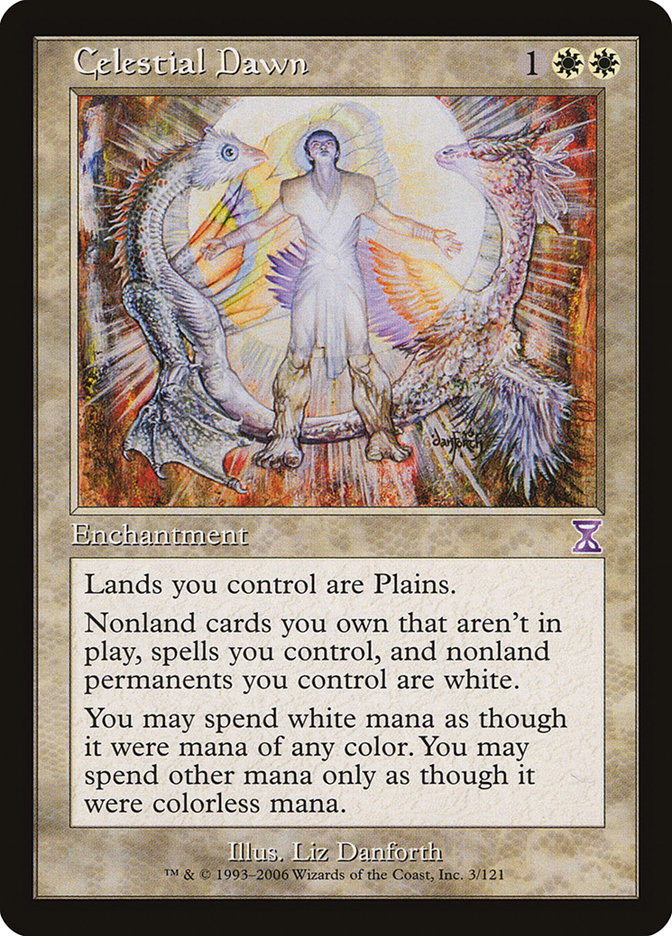Imperio de la ley Carta MTG
| Colecciones da carta | Lanzado en 3 coleccionesVer todos |
| El coste de maná | |
| Costo de maná convertido | 3 |
| Rareza | Extraña |
| Tipo | Encantamiento |
Texto de la carta
Ningún jugador puede jugar más de un hechizo cada turno.
Los miembros del tribunal, nombrados por el mismo kha, aseguran que todas las disputas se resuelvan con suma imparcialidad.
Cartas Similares
La carta de Regla de la Ley presenta un enfoque estratégico para el control dentro de Magic: The Gathering. A menudo se compara con sus contrapartes como el Eidolon de Retórica. Ambas imponen un límite estricto de un hechizo por turno, ralentizando efectivamente a los oponentes que dependen de lanzar múltiples hechizos de forma rápida. Sin embargo, el Eidolon de Retórica añade una criatura adicional en el tablero, lo cual puede ser de doble filo: beneficioso como bloqueador o susceptible a ser removido.
Además, observamos el Laboratorio Arcano, otra carta con un efecto idéntico a la Regla de la Ley. Si bien el Laboratorio Arcano comparte las mismas funcionalidades, es parte de los sets más antiguos, lo que hace que la Regla de la Ley sea una opción más accesible para los jugadores con sus reediciones en ediciones más recientes. Luego está el Silencio Ensordecedor, que es un poco más indulgente ya que solo restringe al jugador a un hechizo que no sea de criatura por turno, ofreciendo un poco más de flexibilidad para las barajas que se centran en estrategias basadas en criaturas.
Al evaluar estas cartas similares, la Regla de la Ley es preferida por su sólida capacidad inhibitoria y por ser un hechizo que no es de criatura, protegiéndola de las comunes remociones de criaturas, asegurando así su lugar como piedra angular en barajas de control en numerosos formatos de MTG.
Cartas similares a Imperio de la ley por color, tipo y coste de maná
Mazos que usan esta carta
Mazos MTG usando Imperio de la ley. Profundiza en la estrategia de los mazos, cartas de aparador, lista de ideas y exportación para jugar en ARENA o MOL.
| # | Nombre | Formato | Arquetipo | Evento |
|---|---|---|---|---|
 | Azorius Control | Pioneer | Azorius Control | Pioneer Challenge 96 2023-12-03 (1) |
Aspectos Positivos de la Carta
Ventaja de Cartas: Aunque el Estado de Derecho no te permite dibujar cartas adicionales de manera inherente, nivelará el terreno de juego al asegurarse de que tu oponente no pueda aventajarte con múltiples hechizos cada turno. Esto te da más control sobre el ritmo del juego, manteniendo indirectamente tu ventaja de cartas.
Aceleración de Recursos: Aunque el Estado de Derecho no genera mana o fichas adicionales, hace un uso eficiente de los recursos existentes. Al limitar a tus oponentes a un solo hechizo por turno, tus propios mana y recursos pueden ser asignados de manera más estratégica, preparando el escenario para jugadas poderosas que pueden inclinar la balanza a tu favor sin necesidad de recursos adicionales de mana.
Velocidad Instantánea: El Estado de Derecho opera a un nivel más allá de la velocidad instantánea. Una vez que llega al campo de batalla, es un mecanismo de juego duradero que moldea continuamente el flujo de la partida. El turno de cada jugador se ve afectado, no solo en el momento instantáneo en que un efecto en la pila se resuelve, y esa influencia continua permanece mientras el Estado de Derecho esté activo en el campo.
Aspectos Negativos de la Carta
Requisito de Descarte: Aunque el Estado de Derecho no requiere descartar una carta, puede obligarte a descartar los hechizos adicionales que no puedas jugar cada turno debido a su límite de un hechizo por turno. Esto puede ser particularmente restrictivo cuando tienes una mano llena de cartas jugables pero estás limitado por la regla.
Coste Específico de Mana: El Estado de Derecho tiene un coste de mana específico, requiriendo un mana blanco además de dos mana genéricos. Este requisito puede limitar los mazos que pueden incorporarlo cómodamente, confinándolo típicamente a mazos basados en blanco o multicolores que puedan producir de manera fiable mana blanco.
Coste de Mana Comparativamente Alto: Con un coste de lanzamiento de tres mana, el Estado de Derecho puede entrar en juego más tarde que algunas de las opciones de control o disrupción de menor coste disponibles. Este retraso permite a los oponentes más tiempo para preparar su juego antes de que se aplique la restricción, potencialmente dándoles ventaja en la construcción de presencia en el tablero o en la ejecución de su estrategia.
Razones para Incluir el Estado de Derecho en tu Colección
Versatilidad: El Estado de Derecho es un encantamiento que puede integrarse perfectamente en varios arquetipos de mazos de control o prisión. Su habilidad para limitar a cada jugador a lanzar un hechizo por turno lo convierte en una herramienta flexible para manejar el ritmo del juego, independientemente de la estrategia del oponente.
Potencial de Combo: Aunque puede parecer contraintuitivo, el Estado de Derecho puede ser un componente clave en mazos diseñados en torno a combos específicos. Ayuda a repeler las respuestas de los oponentes, asegurando que tu secuencia de jugadas cuidadosamente elaborada pueda resolverse sin interferencias.
Relevancia en el Meta: En entornos donde los jugadores tienden a lanzar múltiples hechizos en un solo turno, el Estado de Derecho brilla al perturbar estas estrategias. Ya sea en un salón de juegos local o en un entorno competitivo, esta carta tiene el potencial de inclinar la balanza a tu favor contra mazos que dependen de lanzar numerosos hechizos cada turno.
Cómo Vencer
El Estado de Derecho es un encantamiento único en el mundo de Magic: The Gathering, estableciendo un límite estricto en el número de hechizos que cada jugador puede lanzar, permitiendo solo un hechizo por turno. Esta carta es muy apreciada por su capacidad para ralentizar a los oponentes y para perturbar estrategias que dependen de lanzar múltiples hechizos en un solo turno. Es un obstáculo considerable para mazos de combo y otros que prosperan con dichas mecánicas.
Sobrepasar las restricciones impuestas por el Estado de Derecho implica ajustar tu plan de juego. Prioriza lanzar hechizos de mayor impacto o aquellos que proporcionen ventajas duraderas. Utilizar habilidades que no cuentan como lanzar un hechizo, como habilidades activadas o desencadenadas, es otra estrategia efectiva. Además, jugar a velocidad instantánea durante el turno de tu oponente duplica efectivamente tu capacidad de lanzar hechizos bajo el Estado de Derecho. Cartas que eliminen encantamientos o que te permitan jugar hechizos sin lanzarlos, como aquellos con flashback o suspender, también pueden ayudar a eludir las restricciones del Estado de Derecho.
En esencia, superar las limitaciones del Estado de Derecho requiere una combinación de ajustes estratégicos e incluir cartas que puedan neutralizar encantamientos o sortear la restricción de lanzamiento. Adaptarse a su presencia en el campo de batalla es fundamental para mantener el impulso de tu plan de juego.
Recomendaciones de BurnMana
Obtener una ventaja en MTG a menudo depende de las capas de estrategia que el Estado de Derecho introduce. Es una carta que puede alterar significativamente el ritmo de cualquier partida, inclinando la balanza a tu favor. Al comprender sus fortalezas y cómo se integra en varios mazos, te estás equipando con una herramienta potente para el control. Si estás interesado en ampliar tus dinámicas de juego, considera cómo agregar el Estado de Derecho a tu colección podría ser un cambio de juego. ¿Listo para intensificar tu juego y hacer que cada turno cuente? Sumérgete más con nosotros y optimiza tu viaje en MTG hoy.
Donde comprar
Si estás buscando comprar una carta MTG Imperio de la ley de un coleccione específico como Mirrodin and Tenth Edition, existen varias opciones confiables que debes considerar. Una de las fuentes principales es tu tienda de juegos local, donde a menudo puedes encontrar paquetes de refuerzo, cartas individuales y mazos preconstruidos de colecciones actuales y pasadas. A menudo ofrecen el beneficio adicional de una comunidad donde puedes intercambiar con otros jugadores.
Para un inventario más amplio, particularmente de colecciones más antiguos, mercados en línea como TCGPlayer, Card Kingdom y Card Market ofrecen amplias selecciones y te permiten buscar cartas de colecciones específicos. Las plataformas de comercio electrónico más grandes como eBay y Amazon también tienen listados de varios vendedores, lo que puede ser un buen lugar para buscar productos sellados y hallazgos raros.
Además, el sitio oficial de Magic suele tener un localizador de tiendas y listas de minoristas para encontrar Wizards of the Productos con licencia costera. Recuerde comprobar la autenticidad y el estado de las cartas al comprarlas, especialmente a vendedores individuales en mercados más grandes.
A continuación se muestra una lista de algunos sitios web de tiendas donde puede comprar las Imperio de la ley y otras cartas MTG:
 COMPRAR
COMPRAR BurnMana es un socio oficial de TCGPlayer
- eBay
- Card Kingdom
- Card Market
- Star City Games
- CoolStuffInc
- MTG Mint Card
- Hareruya
- Troll and Toad
- ABU Games
- Card Hoarder Magic Online
- MTGO Traders Magic Online
Ver productos MTG
Impresiones
La carta Imperio de la ley Magic the Gathering se lanzó en 3 colecciones diferentes entre 2003-10-02 y 2019-07-12. Ilustrado por Scott M. Fischer.
| # | Liberado | Nombre | Código | Símbolo | Número | Marco | Disposición | Borde | Artista |
|---|---|---|---|---|---|---|---|---|---|
| 1 | 2003-10-02 | Mirrodin | MRD | 19 | 2003 | Normal | Negra | Scott M. Fischer | |
| 2 | 2007-07-13 | Tenth Edition | 10E | 37 | 2003 | Normal | Negra | Scott M. Fischer | |
| 3 | 2019-07-12 | Core Set 2020 | M20 | 35 | 2015 | Normal | Negra | Scott M. Fischer |
Legalidades
Formatos de Magic the Gathering donde Imperio de la ley tiene restricciones
| Formato | Legalidad |
|---|---|
| Historicbrawl | Legal |
| Historic | Legal |
| Legacy | Legal |
| Oathbreaker | Legal |
| Gladiator | Legal |
| Pioneer | Legal |
| Commander | Legal |
| Modern | Legal |
| Vintage | Legal |
| Duel | Legal |
| Explorer | Legal |
| Predh | Legal |
| Penny | Legal |
| Timeless | Legal |
Reglas e información
La guía de referencia para las reglas de las cartas Imperio de la ley de Magic: The Gathering proporciona las reglas oficiales, las erratas emitidas, así como un registro de todas las modificaciones funcionales que se han producido.
| Fecha | Texto |
|---|---|
| 12/07/2019 | Si lanzas un hechizo que fue contrarrestado, no puedes lanzar otro hechizo durante el mismo turno. |
| 12/07/2019 | La Regla de Ley analiza todo el turno para ver si un jugador ha lanzado un hechizo, incluso si la Regla de Ley no estaba en el campo de batalla cuando se lanzó ese hechizo. Es importante destacar que no puedes lanzar la Regla de Ley y luego lanzar otro hechizo durante el mismo turno. |
